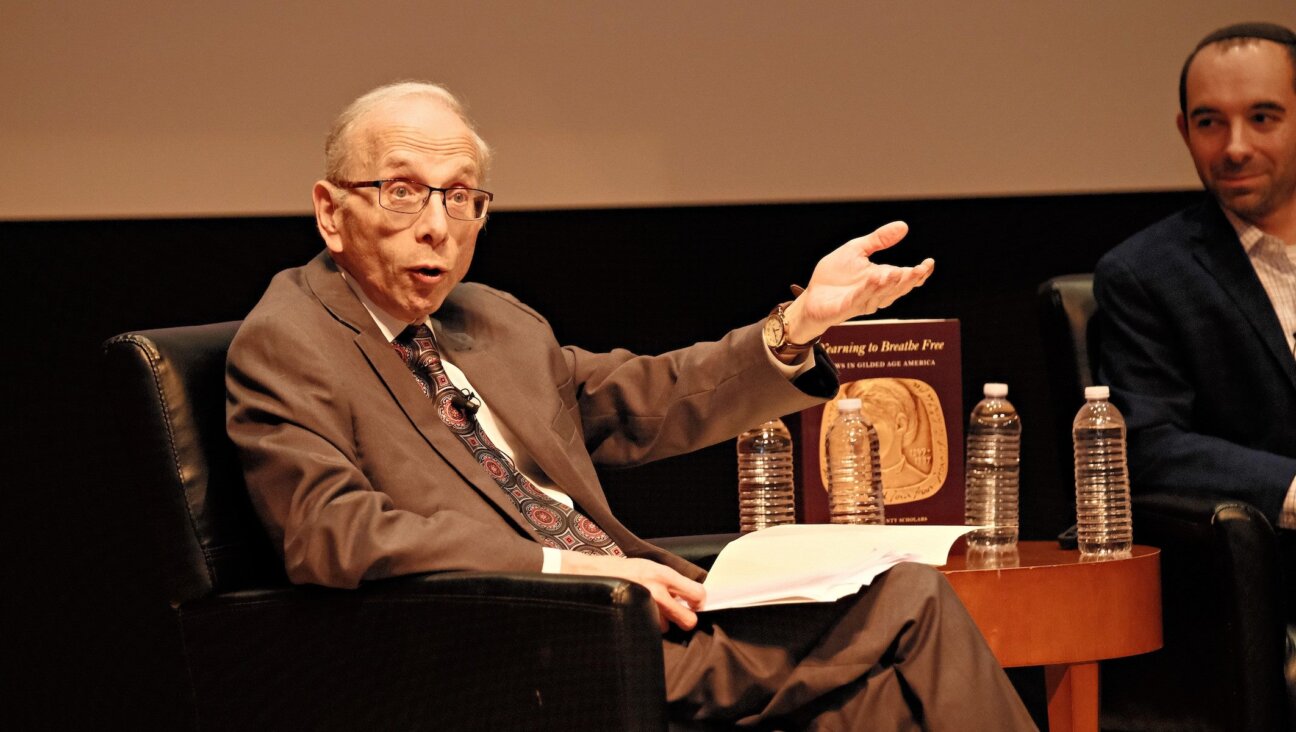Vice Video Uses Woman Rabbi as Exhibit A of White Liberal Guilt

Can anti-racism be gift-wrapped? Image by Getty Images
Via journalist Jesse Singal’s Twitter, I found one heck of a recent Vice story and video about something called the Safety Pin Box, a subscription service for white people who want to learn how to be better allies to people of color. “This is literally everything I have been whining about about corporate woke liberalism for the last year,” Singal tweeted. That is, for sure, part of what’s going on, and an angle it’s worth pausing on before turning to the Vice presentation thereof:
While there’s something appealing about black women (as versus, say, Macklemore) profiting from white liberal self-flagellation, rather than serving as unpaid anti-racism educators, the self-flagellation approach is generally quite unhelpful, and all too often way for white people to self-promote while imagining they’re doing good. The notion that white people would be purchasing ‘one of the good ones’ certificates is off-putting, as is the commercialization of activism. And it has struck me for a while that progressives should focus on (educating? calling out?) the unconvinced half of the country, rather than on finessing etiquette and jargon usage among the already persuaded.
Then I watched the video. I came away from it a bit annoyed about the box’s clueless customers, who think they can shop their way out of racism, but, unexpectedly, even more put off by the Vice critique of the same.
In the December 23rd video, posted to Vice on Janurary 2nd, Evan McMorris-Santoro, a young white (or at least white-presenting) reporter, visits with Safety Pin Box founders Marissa Johnson and Leslie Mac, as well as “one of the customers who is wholeheartedly on board.”
The video’s real find is a box subscriber willing to be publicly identified as such. After a brief intro, the video presents Barat Ellman, “a rabbi and professor of Jewish Studies who lives in Park Slope, Brooklyn.” We see her getting her safety pin box in a shot that suggests Ellman lives not just on a pretty street in an upscale (left-leaning, intellectual) neighborhood, but in an entire (gorgeous) brownstone, not just an apartment. That is, we see her walking down the stairs to get her mail.
The entire scene appears to be a stock image of limousine liberalism – the shininess of the door… which bears signs welcoming refugees and demanding “justice for Freddie Gray” and other black men killed by police. “Barat’s holiday gift haul this year includes something for herself,” narrates McMorris-Santoro. Between the narration and the editing, it’s hard to escape the idea that viewer is supposed to find Ellman, and the entire situation, preposterous.
The video then switches back to Grand Rapids, Michigan, where Johnson, Mac, and two unnamed white men are assembling the boxes. McMorris-Santoro interviews Mac, with an interview style that involves putting provocative words into the mouths of sources and waiting to see how deftly they refute his assumptions:
“The epicenter of white guilt is the white middle-aged mom who voted for Hillary but saw Trump win on the back of the white women vote. That’s where the money is.” (He repeats the money remark a second time verbatim.) “That’s where the cash is, right?”
Mac doesn’t agree: “Well the cash is in all the white people’s wallets,” she notes. If the imagined customer is indeed from the demographic McMorris-Santoro suggests, Mac adds, “That’s where the desire is to do the work.”
In other words: McMorris-Santoro wants to have a shared laugh with Mac at the expense of clueless white women (and, crucially, at her customers). She does not oblige. Instead, she outright rejects the idea that liberal white women of a certain age are the very worst white people out there.
The more I watched this scene, the more annoyed I got, not at Mac for profiting from white guilt, nor at white “subscribers” for being hilariously oblivious, but at McMorris-Santoro, for presenting himself (and white men generally, along with young white women, or white women who aren’t, horrors, mothers) as somehow in on the joke. It’s only those older white women, those moms, who are the problem.
That aspect of the video put me off – the very last thing we need at the moment is white male progressivism that scapegoats anti-racist women of a certain age. We wind up in that unpleasant realm where the Real Problem comes not from racist white men, but rather anti-racist white women past the age of mattering in our society.
So we meet exactly one subscriber, and while she is indeed a pale-skinned woman who looks to be well over 25, we don’t know whether she’s a “mom,” but rather that she’s a professional in a field where social justice advocacy would be relevant to her work. While we might infer that she wasn’t Team Trump, whether she was more for Hillary or Bernie, this, too, isn’t known.
We’re then back in Ellman’s dining room. She has straight, fine, strawberry-blond hair, light eyes, and is wearing a buttoned-up cardigan. We hear her reading the instructions in her box, stumbling on the expression “white supremacy.” McMorris-Santoro offers a quip about how sure he is that there are New Yorker magazines in that house and she admits that there are. The remark is perhaps best interpreted a signal of sorts to the young, hip white left that this is the home of a stodgy, middlebrow White Lady, absolving them their own biases. Clever!
McMorris-Santoro pushes further, asking Ellman to agree that the box is “this is the black woman you invite into your house every month.” She at first seems like she’s not going to take the bait (that is, she refutes the absurd notion that this box is an imaginary Black Girlfriend she’s paying for), but then admits that until some recent activist work in New York, she didn’t much interact with people of color.
What’s the takeaway? In one sense, here’s an honest assessment of our segregated society, and a Jewish woman trying to challenge it. In another, look at that white lady admitting she doesn’t have non-white friends, despite living in Brooklyn. (“Girls” Season 1 all over again.) Get out the pitchforks, holier-than-thou fellow white people who may or may not have black friends, either!
A third possibility: This is about a young white man mocking a middle-aged white Jewish woman for mistakenly thinking the likes of her could ever be woke.
Which brings us to the questionable choice of a Jewish woman, a rabbi, even, as Exhibit A of white anything.
The choice to make this rabbi an example of white liberal guilt, as versus of Jewish clerical participation in the ongoing civil rights movement, is, well, a choice. Ellman mentions other activism, activism of the non-box variety. More to the point: As a Jew, she’s a member of a group that, whether she realizes it or not, has been (re)classified as not quite white in the current political environment.
I get that the new left populism is about everyone joining forces to declare liberal elite white ladies in places like Park Slope the shared enemy – shared, that is, with populists of the right. But how does this square with the fact that more often than not, the “white ladies” so classified are Jewish women, who are targets not just of mostly-friendly intra-left mockery but of, well, of those rebranded Nazis who feel so empowered after Trump’s win.
A response to Singal’s tweet reads as follows: “that white lady seems so afraid of PoC she thinks her only recourse is reading antiracist fortune cookies alone in her BK loft”
Again, I’d be reluctant to call a rabbi a “white lady” in the current political climate. But setting that aside, I think that’s right, but not in the (racist) sense of, she’s holed up in her Park Slope home for fear of crossing paths with a black man.
I’m thinking of a great tweet by (pseudonymous) Moebius Stripper, in an unrelated context: “If you’re so woke that you refrain from interacting with marginalized people for fear of offending, you’re doing life wrong”
This has, I’ve also argued, been the downside to the new Awareness culture. While it’s important for marginalized people’s marginalization to be visible, it doesn’t necessarily help matters to recast every human interaction in terms of relative privilege according to identity categories. There’s a threshold past which Awareness stops meaning white people are more sensitive towards their non-white friends (or indeed Christians to their Muslim or Jewish friends), and starts discouraging these friendships altogether. It’s important for white people to know their black friends deal with racism, their Jewish friends with anti-Semitism, and so on. But the end goal isn’t an eggshell approach to interpersonal interaction. And that is, alas, what approaches like subscribing to an anti-racist box tend to foster.
Phoebe Maltz Bovy edits the Sisterhood, and can be reached at [email protected]. Her book, The Perils of “Privilege”, will be published by St. Martin’s Press in March 2017.























